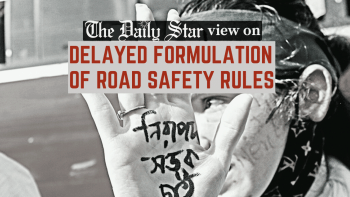Safe roads before smart cities

The manner in which the human toll of road crashes has been rising in Bangladesh is anything but normal. We end each year with the ignominy of having surpassed last year's records in road crashes and casualties, only to begin another year with fresh horrors. This time, too, has been no exception. As an estimate released by the Road Safety Foundation shows, 2022 was one of the deadliest years on record for the transport sector, with its numbers of crashes and deaths registering an increase of 27.14 percent and 22.74 percent over corresponding figures in the previous year.
The organisation has also released a number of figures that can help us understand the extent of the danger that passengers, and the nation as a whole, face. It said that 81.36 percent of the 7,713 road crash victims counted last year were aged between 18 and 65 years – the most productive segment of the population – while students accounted for 16 percent of those who died. In the end, the loss to the workforce suffered through these tragedies has amounted to a staggering Tk 23,460 crore. The figure, we are told, would be more than 1.5 percent of the country's GDP if property damages are also taken into consideration.
Another important revelation has been about how Dhaka division – which hosts the capital of the country – emerged as the most unsafe among all divisions. Dhaka has seen the highest number of both accidents and fatalities, with 2,044 individuals dying in 1,841 crashes. The second highest death toll was recorded in Chattogram.
All these figures have significant socioeconomic implications for the country. It goes without saying that the road and transport authorities have totally failed to perform their responsibilities, despite frequent appeals from citizens to ensure the safety of our roads and highways. The situation makes a mockery of the promises made by the government in 2018 before enacting the Road Transport Act – which, by the way, still remains largely unimplemented – as well as the vision of a Smart Bangladesh that the ruling party has recently set for us. Clearly, at the moment, citizens need safe roads more than a smart country or smart cities, whatever that means.
The spectacular lack of progress in the transport sector betrays a spectacular lack of concern at the policymaking level, which is really disturbing. Recently, the government, over four years after passing the act, has finally formulated its rules which, among other provisions, have detailed the compensation that victims of road crashes can expect to receive. This was an important move, if long overdue. But significant uncertainties still remain about the act itself. For this act and its rules to ever serve the public and reduce their sufferings on the roads, the authorities must ensure they are properly, regularly and evenly enforced.
We urge the higher authorities to take meaningful action to fix the transport sector, but also hold to account those who have consistently failed to deliver results. Given how bad the situation has been of late, they must put people's safety at the heart of policymaking.

 For all latest news, follow The Daily Star's Google News channel.
For all latest news, follow The Daily Star's Google News channel. 







Comments